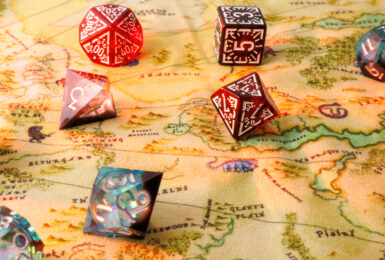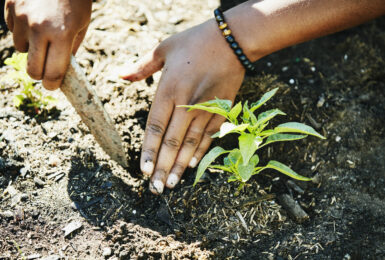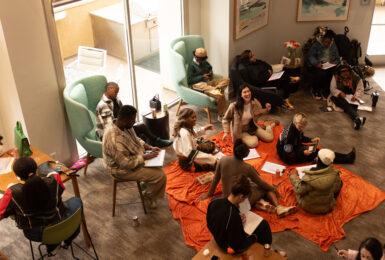
Culture
No, You’re Not Invited To The Cookout: The Sacred Act Of Cultural Protection In The Midst Of Modernity
Scroll through the comment section of a TikTok video featuring some well-to-do white person dancing with any semblance of rhythm, and you’ll find endless invites to the cookout, with a side of decadent affirmations. On the surface, the endearment coming from the Black community is innocent, playful, and of course embracing. In some ways, it even feels like an inside joke — this is the white person special enough to enter our cultural safe space, they can sit with us. Though here’s the thing, handing out digital invites to any ole body with no regard threatens that same cultural safety, as well as the integrity and sacredness of the space. Because these interactions take place in the digital sphere, you may think this is inflated. However, I challenge you to reflect on the sociopolitical impact of the digital landscape we interact and contribute to, and how the weight of our words shape our cultural agreements, beliefs, and the potential actions of ourselves and others.
In today’s era of fascism amplified by social media—with its AI bots, fake news, and rage-bait, red-pill content, we should recognize that performative posts and declarations of solidarity rarely constitute true allyship. White content creators who address ongoing injustices in the United States are merely fulfilling a basic civic and human responsibility, not performing extraordinary applaud-worthy acts. Meanwhile, it’s disheartening to witness the rejection of Black individuals who don’t conform to rigid “normalities” (whether heteronormative, neurotypical, queer, goth, or punk) by other Black people, who simultaneously extend metaphorical “cookout invitations” to any white person showing minimal cultural competence. Creating such a superficial threshold for white acceptance into Black cultural spaces demonstrates lazy, irresponsible thinking and a profound lack of discernment. This failure of intersectionality, which excludes those we should embrace while admitting those we should scrutinize, only reinforces white supremacy and colonial ideologies, preventing us all from achieving genuine liberation and progress.
As the rapid advancement of technology threatens our collective and cultural memory, the question arises: what do we deem culturally sacred? What traditions, memories, recipes, and narratives have been discarded or distorted as we navigate technology’s ongoing development? Because elements not treated with sacredness decrease in value and importance. Cambridge Dictionary defines gatekeeping as “the activity of trying to control who gets particular resources, power, or opportunities, and who does not.” Despite current sociopolitical systems struggling to persist, we still live in a world where systems created for particular identities/bodies wield power that others don’t have equal access to. Thus, gatekeeping becomes a form of honoring a rich legacy of resilience and ingenuity while exercising discernment about who gets to revel and rejoice in it.
I understand that it’s not convenient or even realistic to protect certain aspects of Black American culture, especially when things are easily accessible and widely shared. It’s on these platforms where African American Vernacular English is mistaken for “Gen-Z slang,” the origins of viral trends that should be attributed to Black creators are erased, and AI-generated mukbang videos mimicking Black women have millions of views. Additionally, social media is a tool used by political leaders and others who hold significant power. It is in live streams, podcasts, and 60-second reels where ideologies and beliefs are being pushed or suppressed, and various discourses evolve and expand, which shape the ways we take action and identify those who are or are not in our corner. If we are unconsciously making social agreements, such as normalizing trending comments used for particular content, that carries weight.
Many are quick to dismiss our insidious past, insisting that slavery and colonialism hold no relevance to our current turmoil. Yet, the deeper narrative unfolding beneath the surface proves otherwise. While today’s stakes may not seem as dire as slavery, the violence born from those origins still lingers, repeating itself against the same communities in uncanny ways. When the keys to my cultural kinesics, our kinesthetic forms of communication are carelessly handed out, it opens the door to a vulnerability ripe for exploitation, whether or not anyone chooses to take advantage. In the wrong hands, this becomes a form of enslavement, especially when someone believes these things aren’t worth protecting because it’s “not a big deal.” The digital cookout or carne asada invite only scratches the surface; it’s a symbol for something larger at play. The cookout, the church, and historic Black and Brown neighborhoods have long been sanctuaries for change and refuge. They are physical spaces of survival…
There’s a kind of inescapable magnetism when Frankie Beverly and Maze’s “Before I Let Go” bounces off the walls of a banquet hall and the syncopation weaves across generations of Black folks gathered on the dance floor, gliding effortlessly in unison. Make no mistake, this ritual syncs heartbeats and bloodlines, invoking ancestral memories and timelines that offer healing embodied in those who have endured so much. Who will remind future generations of the value of this dance and its magic? That, if only for a moment, the joy we cherish is more than fleeting, but a somatic activation worthy of keeping close. The griot is the gatekeeper who grabs hold of the narrative and says, “I will pass this on, keep this alive, and uplift it to its rightful place.” In between sucked teeth, as “heifer” rolls off the tongue of the woman preparing a feast for the family, is divinity and a saving grace. The melodic recital of call and response is a poetic language encoded in our culture. That, too, is a family heirloom, polished to perfection, ripe and oozing with potential to name again what is ours…
Social media is a double-edged sword, where the lines, fine and dangerous have been blurred. Nonetheless, the stakes are still high. The cookout is still deep. When our circumstances hit the fan, who do we trust, and where do we go if what we assumed to be “ours” has been infiltrated? What happens if language, symbols, and cultural codes are co-opted by organizations eager to secure monetary resources for themselves? (Plot twist: this happens!) Contrary to popular belief, multiple perspectives can exist at once, and I do believe that culture is meant to be enjoyed, appreciated, shared, and celebrated among people. In the same breath, it can be weaponized, bastardized, and degenerated. If we don’t demonize the desire of those who want to gatekeep, then perhaps it could be a brave and admirable act of love rather than a bitter taste of limitation. Here, we can honor both innovation and preservation, inviting the sacred back into the chat.
Get The Latest
Signup for the AFROPUNK newsletter




